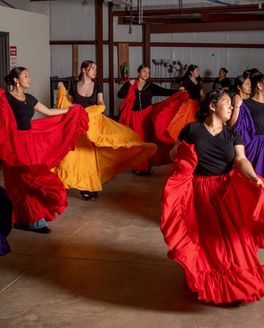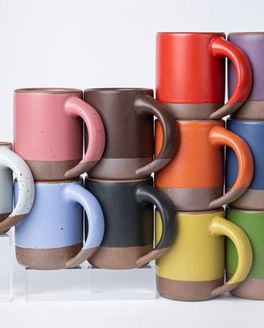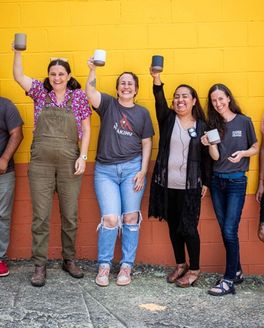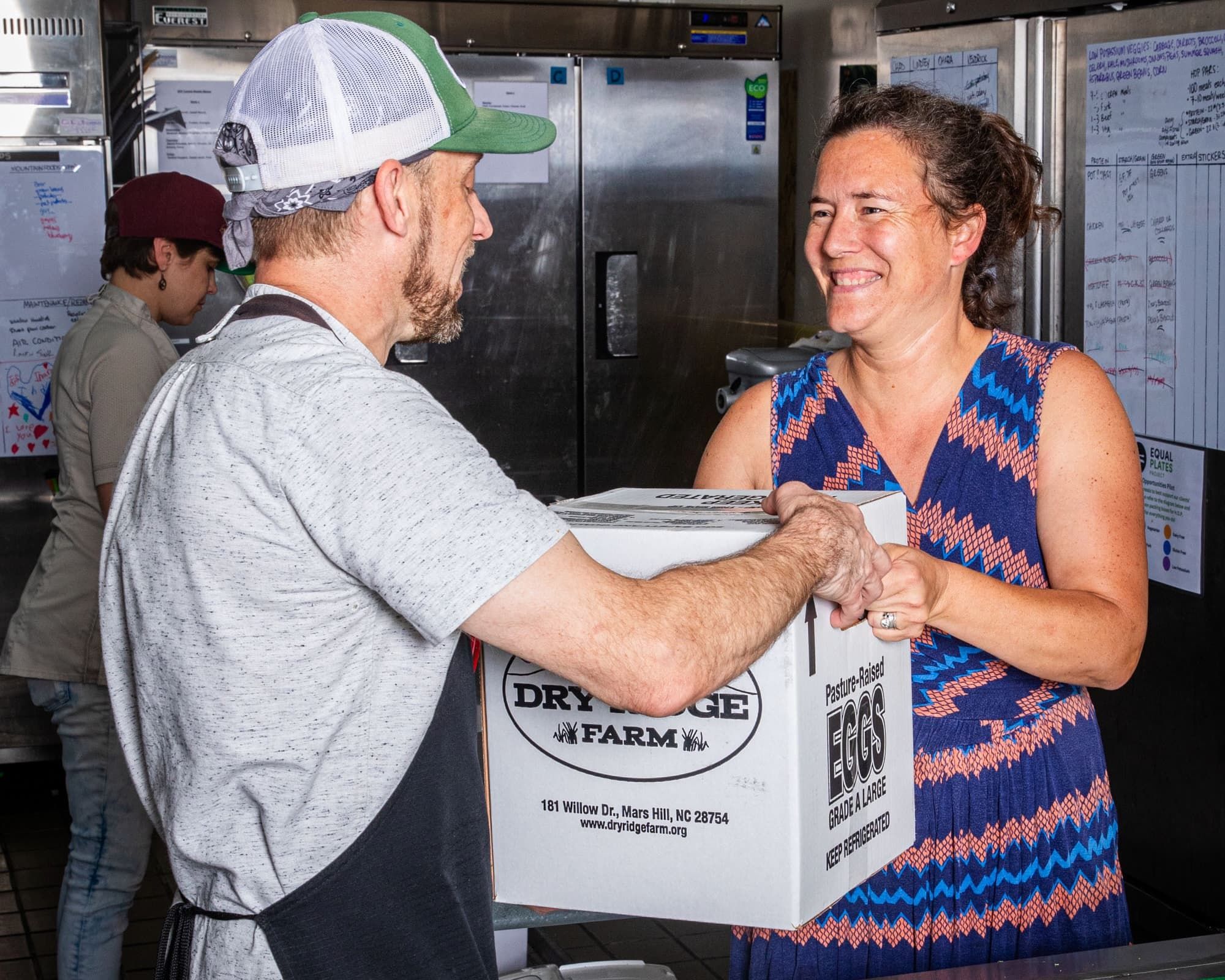
A Holistic Approach to Nourishment
Standing on the two core pillars of supporting local farms and sharing scratch-made meals, Equal Plates Project tackles food insecurity in Asheville with a generative cycle of nourishment.
For Equal Plates, satisfying hunger is about much more than access to calories. “Food insecurity is really a symptom of poverty, racism, and systemic inequities,” said Director Madi Holtzman, “and a lot of the time it can be invisible…Hunger in the U.S. can look different here than in other parts of the world…it can be a lack of access to nourishment.”
According to Feeding America, 44 million people in the U.S. are food insecure. That’s 1 in every 6 people without enough food to eat or access to healthy food. Alongside children, seniors, and other vulnerable populations, our neighbors who have been chronically unhoused often bear the worst brunt of inflation—a contributing factor to food insecurity. Every county in the U.S. is home to people who have barriers to food access, including East Fork’s home in Buncombe County.
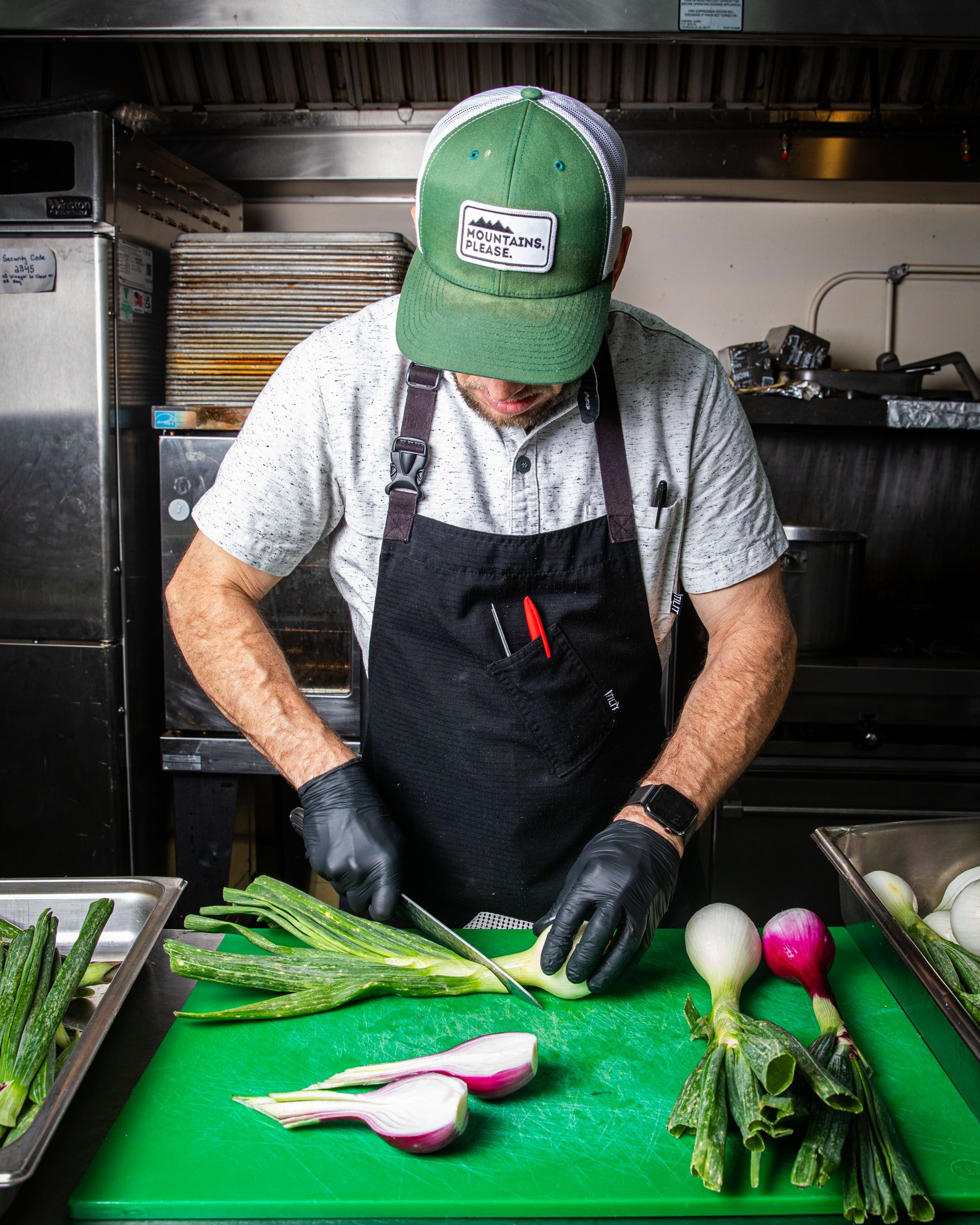
Rising to meet the overwhelming need, Equal Plates operates with a small crew of staff, professional chefs, and a dedicated group of volunteers. They utilize a large kitchen at downtown Asheville’s Central United Methodist Church to prep fresh ingredients and transform them into scratch-made meals. Over 20 small, local farms provide the produce, meat, dairy, eggs, and grains that go into big batches of healthy meals— around 1500 per week and counting. Those hot meals are distributed to Equal Plates’ community partners, enhancing the programming of organizations doing on the ground work to address poverty and community-building, like subsidized senior residencies, parenting support groups, and emergency shelters.
“Over 50% of our entire food budget goes directly to small, local farms. The full value of these ingredients goes directly to the farmer, and not a middleman. The level of local we’re doing is a serious commitment,” Madi asserted. “Purchasing from them also really impacts the viability of these small farms.”
Operations Manager Katy Estrada added, “...families receive quality food with dignity because of the relationship we have with our farmers. We’re not asking the farmers to donate or provide seconds or thirds, they’re providing their highest quality ingredients to our kitchens, the same as they would to Rhubarb or Curaté down the street.”
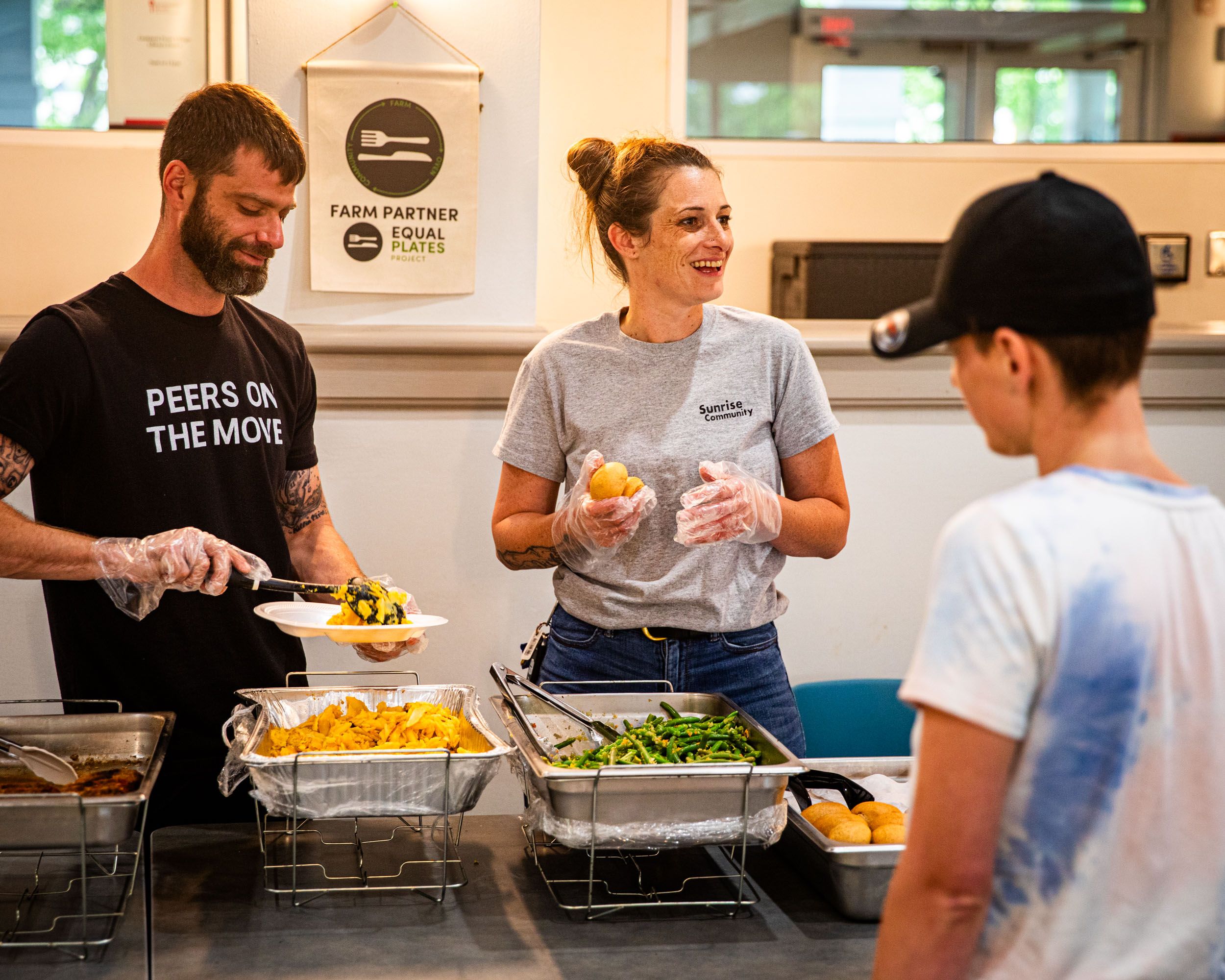
During a typical weekday morning in the kitchen, you can find chefs Chad Holmes and Lindsey Davis, plus a handful of volunteers working side by side, prepping to ensure meals are ready to be delivered to various community partners, including the residents of Homeward Bound’s Compass Point Village, low-income seniors living in subsidized units, emergency shelters, and support groups for families involved in the justice system.
“Because we do a lot of our own deliveries, we get to meet some of the folks who we share meals with,” Chad said, “and they share that the meals are making a huge impact on their day-to-day lives.”
Echoing Chad, Susanne Walker Wilson, Senior Trainer at Resources for Resilience said, “I wish you could see how much the families love this food and hear these people talk about their lives and just what it feels like to be nourished and nurtured by these meals.”
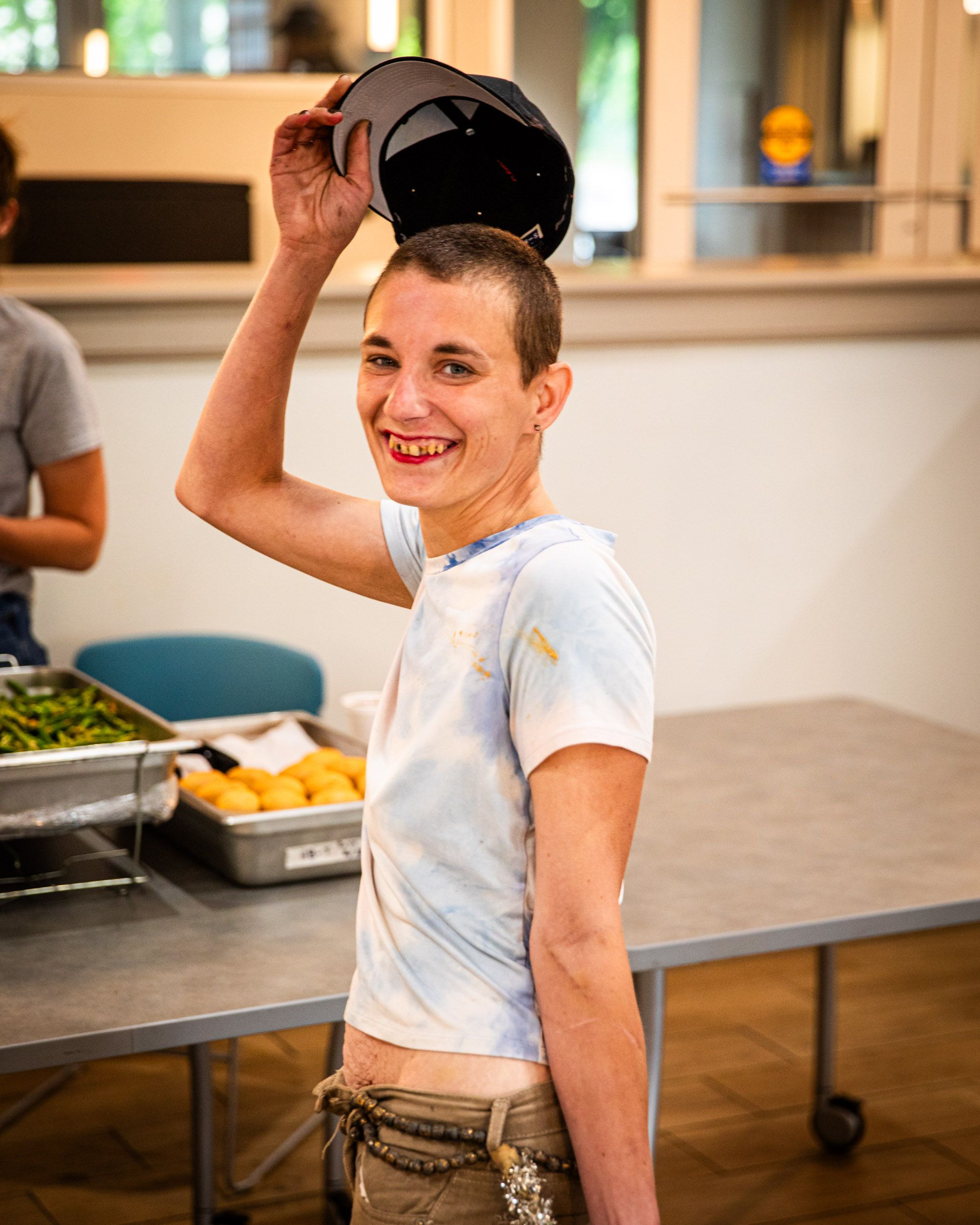
Both chefs Chad and Lindsey have backgrounds in the restaurant and food industry. Formerly a Whole Foods chef and team leader, Lindsey developed a taste for batch cooking and kitchen management through 13 years of valuable experience. Chad, who’s been cooking for 30 years, helped open Katie Button’s award-winning Curaté, and also worked as chef de cuisine for Nightbell. High quality is woven into each part of the process, from farm, to oven, to community.
“One of our farmers in Marshall harvests their chickens in the morning, and then they bring it to us midday, and we have them in the oven that afternoon…it’s probably the freshest chicken in Asheville,” Chad noted.
Collards, a southern staple crop, often find their way into community meals, or parsnips slipped into mashed potatoes for an added nutritional boost. Approachable, familiar foods like lasagna and butternut squash mac-n-cheese are also menu favorites.
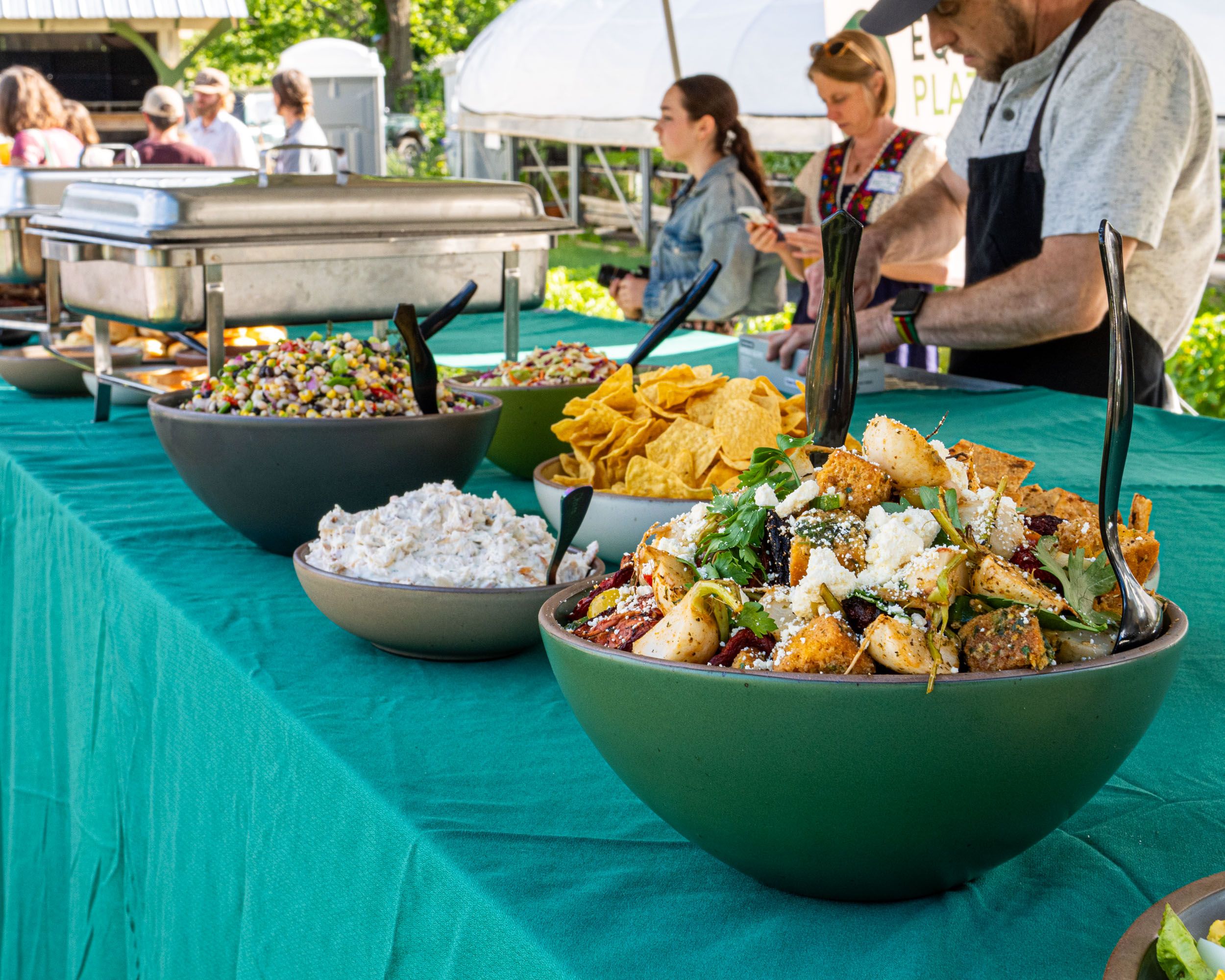
“The butternut mac is a good embodiment of what we’re trying to do,” Lindsay told us. “We contracted with Full Sun Farm in Big Sandy Mush to grow this butternut squash. They’re a tiny farm, so we gave them a new sales outlet. By folding it into the mac-n-cheese, it’s really important to us to share meals that are culturally appropriate, that people actually want to eat, and that are providing comfort and nourishment. The butternut is a good example of how we use local food.”
Equal Plates’ community meals are shared on a context-based sliding scale. They fully donate meals to some partners, while offering highly subsidized, affordable rates to others. Federal grants severely restrict, and in many cases, don’t allow grant funds to be used for costs associated with food and beverages, which presents a huge challenge to many nonprofits who understand that community-building often begins with setting a generous table.
Some of the other community partners Equal Plates has developed relationships with include 12 Baskets, the Safe Shelter, Salvation Army Code Purple, Resources for Resilience, and the Healthy Opportunities Pilot (HOP), a statewide North Carolina pilot program aiming to reduce the need for clinical interventions by using Medicaid dollars to pay for holistic services. Equal Plates delivers between 600-700 meals a week through HOP, an invaluable resource supporting the health and wellbeing of our neighbors and community resilience as a whole.
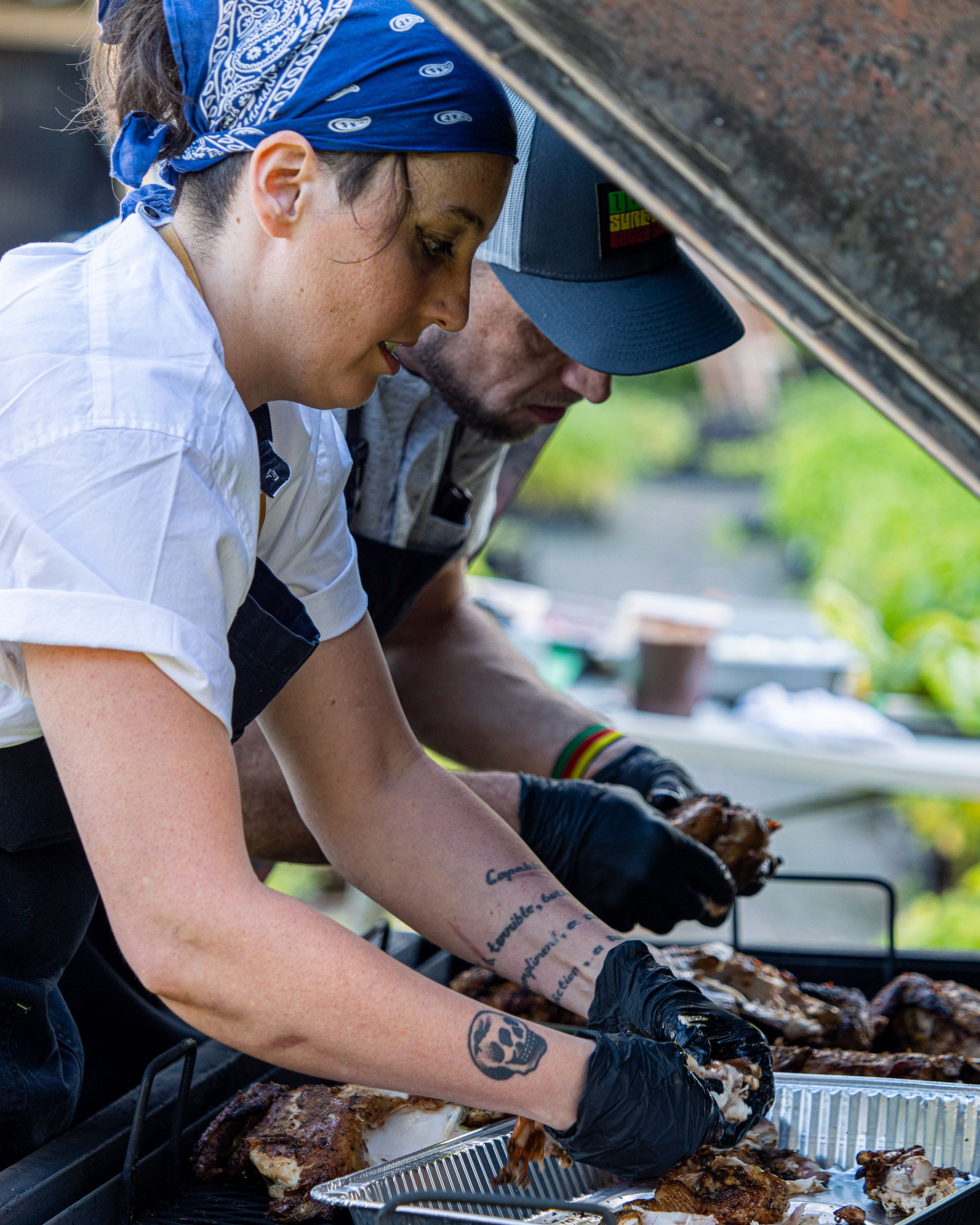
“We want to grow,” Madi shared, “The problem can feel overwhelming, but the potential for us to sustainably scale is equally infinite.”
With plans to expand into a second kitchen so they can increase their capacity, Equal Plates hopes to launch a buy one, give one catering program. The idea is that people will be able to use Equal Plates for catering slightly above market rate, paying for their own meal in addition to a donated one. That extra boost in capacity would allow them to support individuals in the community facing food insecurity and other community organizations without a food budget who are doing incredible work.
Nourishing, local food may not be the sole answer to the wounds of poverty, isolation, and other systemic inequities, but the immense value of gathering around the table and sharing healthy food can’t be overlooked as a crucial step on the pathway to healing. It’s a grounding principle and vital element to building a better, more equitable world.
If you’d like to support the work of the Equal Plates Project, please consider lending a hand by volunteering or donating today!
